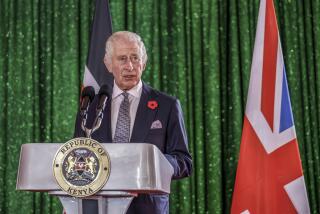Tutu Leads Foreign Guests on Tour of South African Slum
- Share via
CAPE TOWN, South Africa — Desmond Tutu, a day after his installation as Anglican archbishop of Cape Town, guided some noted guests Monday through the mud and shanties of one of South Africa’s poorest slums.
Among those he escorted to the Crossroads squatter camp were Archbishop of Canterbury Robert A. K. Runcie and Coretta Scott King, widow of the U.S. civil rights leader, Martin Luther King Jr.
“It really defies the imagination,” King said, gazing from behind a barbed wire fence at makeshift shacks and at puddles filled with raw sewage.
On a visit earlier in the day, Runcie, spiritual leader of the 74 million Anglicans worldwide, said: spoke with families at their shacks.”I’ve been horrified to walk through the dirt and squalor and smell and flies. This is something I feel has got to change.”
Others going to Crossroads with Tutu included Archbishop Edmond L. Browning, the presiding bishop of the U.S. Episcopal Church in the United States; the Rt. Rev. Maurice Benitez, Episcopal bishop of Texas, and Archbishop Manasses Kuria of Kenya.
“The contrast between the exquisite beauty of Cape Town and the utter squalor (that) humans face at Crossroads is just too miserable,” Benitez said.
Tutu, installed Sunday as leader of the Anglican Church in southern Africa, told Runcie of factional fighting at Crossroads in May and June that left scores of people dead and thousands of black squatters burned out of their homes.
“The root cause of all the problems we have had here is apartheid,” Tutu told Runcie as they looked across one of the bulldozed fields where thousands of people had lived.
Apartheid is the system of racial segregation and minority white rule that exists in South Africa.
Tutu negotiated a truce in June between Crossroads’ warring factions.
Tutu is among those who have suggested that security forces allowed the vast destruction of homes because this was in accordance with government efforts to relocate many Crossroads squatters at a new settlement farther from Cape Town.
He said the two sides at the peace talks he led “agreed the real enemy is the system.”
Talking to King, Tutu compared the barbed wire fence around the razed area to the Berlin Wall. “The police patrol it to stop the people coming back,” he said.
King, who may meet with President Pieter W. Botha on Tuesday, replied: “Evil and injustice cannot reign forever. It will have to give way.”
In one home, Runcie asked a man in his 20s, Salvion Ngxamngxa, what he did for a living.
“I have nothing to do,” the man said.
“What would you like to do?” Runcie asked.
“Anything,” Ngxamngxa said.
Runcie, struck by the large number of military vehicles patrolling the area, said: “You’re not going to solve problems at this scale unless the whole community works together. The whole atmosphere--the armored vehicles, the barbed wire--says this is not a community working together.”
Runcie described conditions at Crossroads as “dramatically more dreary than I expected,” adding, “On TV . . . you see the conflicts and dramatic moments, but you don’t see the dehumanizing of people.”
Tutu said he brought his guests to Crossroads “to see how our brothers and sisters live.”
“When we describe overseas that this is what apartheid does, it is often not easy, even when people want to believe you. They don’t really grasp how horrible it is,” Tutu said. “And now they can see for themselves that, cheek by jowl with the wealth of this country, you have this kind of squalor.”
More to Read
Sign up for Essential California
The most important California stories and recommendations in your inbox every morning.
You may occasionally receive promotional content from the Los Angeles Times.









